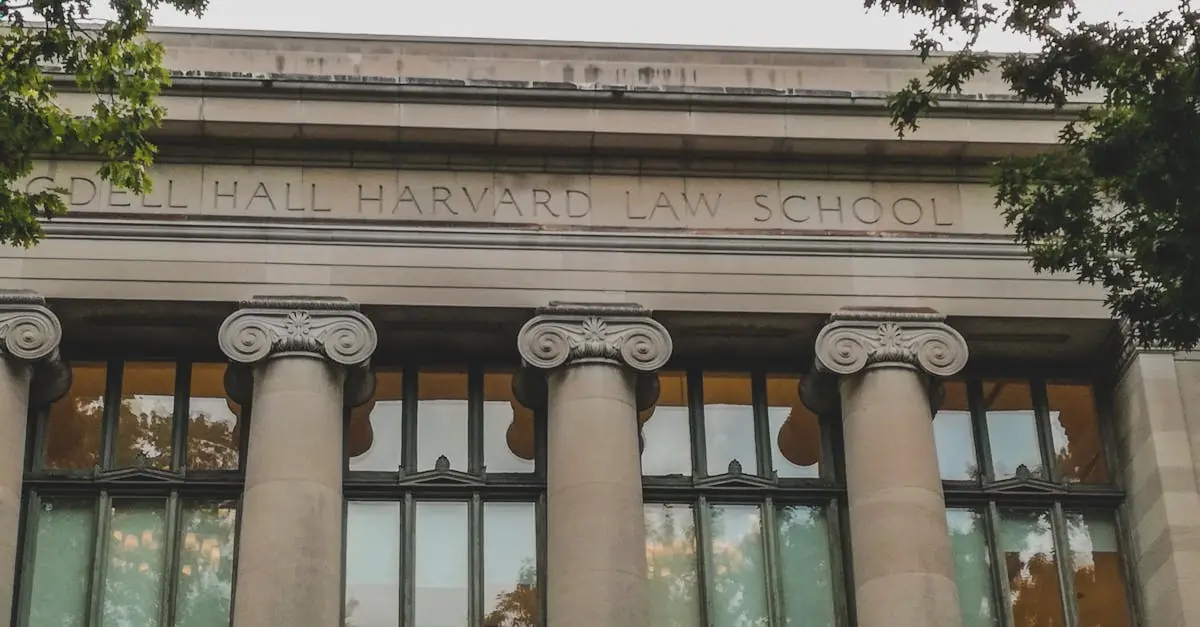Table of Contents
ToggleNavigating the world of politics can feel like trying to find a needle in a haystack—if that needle was also a flaming sword and the haystack was made of bureaucracy. Graduating from a School of Public Affairs in Political Science isn’t just about earning a degree; it’s about arming oneself with the skills to tackle these challenges head-on.
Overview of Political Science Graduate Programs
Political science graduate programs provide advanced education in governance, political behavior, and institutional analysis. Typically, they offer Master’s degrees and Doctoral degrees, focusing on essential research methodologies and theoretical frameworks.
Curriculums often include courses that cover public policy, international relations, political theory, and comparative politics. Engaging in these courses allows students to develop critical analytical skills necessary for assessing complex political situations.
Many programs emphasize practical experience through internships, research projects, and fieldwork. Such opportunities enable students to apply theoretical knowledge in real-world contexts, fostering a deeper understanding of political dynamics.
Networking opportunities also play a significant role in political science graduate programs. Connections with alumni, faculty, and professionals can lead to career advancements in government, non-profit organizations, and academia.
Moreover, research components are integral to many graduate programs. Students frequently explore relevant topics, often contributing original findings that enhance the existing body of political knowledge.
Ultimately, political science graduate programs equip individuals with comprehensive skills in analysis, research, and policy evaluation, allowing graduates to navigate diverse political environments effectively.
Academic Curriculum
The academic curriculum for a political science graduate program in a School of Public Affairs focuses on comprehensive education. It balances theoretical and practical applications designed to navigate complex political environments.
Core Courses
Core courses provide foundational knowledge essential for understanding political dynamics. Students examine subjects such as public policy, international relations, and political theory. Institutions often require classes in comparative politics, equipping graduates with the tools to analyze diverse political systems. Additionally, research methodologies form a critical component, enhancing analytical capabilities and allowing for informed decision-making. This combination ensures that students gain well-rounded expertise applicable in various political contexts.
Elective Options
Elective options allow students to tailor their education to specific interests and career goals. Popular electives may include topics like environmental politics, urban policy, and global security. Moreover, seminars offer deeper insights into contemporary political issues and trends. Students benefit from the flexibility to explore diverse areas, fostering unique skill sets and knowledge. Faculty often encourage pursuit of individualized projects, further enriching the academic experience and preparing graduates for various professional paths.
Faculty and Research Opportunities
Faculty members at the School of Public Affairs play a crucial role in shaping students’ academic experiences. Their diverse expertise encompasses various fields, including public policy, political theory, and international relations. Engaging with professors who publish often in reputable journals offers students insight into cutting-edge research. Notable faculty members frequently advise graduate projects, providing mentorship crucial for career advancement.
Notable Faculty Members
Professors are highly regarded for their contributions to political science. Dr. Emily Carter focuses on environmental politics and teaches courses on sustainability and governance. Dr. James Lee specializes in comparative politics, exploring policy impacts across different regions. Students benefit from interacting with faculty who actively participate in national and international conferences. These connections often continue beyond the classroom, fostering networking opportunities essential for future careers.
Research Initiatives
Research initiatives at the School of Public Affairs emphasize hands-on learning. Students can join faculty-led projects that examine current political issues, enhancing analytical skills. Programs include policy evaluations, community-based research, and data analysis. Opportunities to publish findings in academic journals exist, giving graduate students a platform for their work. Collaborative research fosters a sense of community among peers while advancing political science knowledge. Engaging with impactful research reinforces their professional growth and academic development.
Student Experience
Student experiences at the School of Public Affairs intertwine academic rigor and community engagement. Students thrive in an environment that encourages collaboration and exploration.
Campus Life
Campus life captivates students with vibrant activities and diverse organizations. From political clubs to guest lectures, options cater to various interests. Social events foster connections among peers, enhancing both friendships and professional networks. Students also engage in workshops focused on skills development. These opportunities promote leadership qualities essential for future careers in public service. Such an active campus culture contributes significantly to personal and academic growth.
Internship and Networking Opportunities
Internship and networking opportunities play a vital role in students’ professional journeys. The School connects students with government agencies and non-profits for hands-on experience. These internships not only build resumes but also provide insights into real-world political dynamics. Networking events hosted by the School promote interactions with alumni and industry leaders. Such connections create pathways for job placements and mentorships after graduation. Faculty members often facilitate introductions, enhancing students’ chances of career success.
Career Outcomes
Graduates from a School of Public Affairs in Political Science find diverse career opportunities across various sectors. Many pursue roles in government agencies, where they apply their knowledge of governance and policy-making to address public issues. Non-profit organizations often seek out graduates for positions in advocacy, program management, and community outreach, utilizing their skills to promote social change.
Academia also attracts political science graduates. Positions such as research associates, lecturers, and professors allow individuals to contribute to scholarly work while mentoring the next generation of political scientists. Alumni frequently publish in academic journals, furthering their careers in research and teaching.
Private sector roles are increasingly popular among graduates. Consulting firms and think tanks value the analytical skills honed during graduate study, often hiring individuals for research, policy analysis, and strategic planning positions. These graduates bring a unique perspective to corporate decision-making processes.
Public relations and communications represent additional career paths. Many individuals leverage their understanding of political behavior to shape public narratives and engage with stakeholders effectively. Skills in writing and communication make them assets in media relations and public engagement roles.
Internship experiences significantly enhance job prospects. Students gain practical exposure through connections with local governments and non-profits, which often lead to full-time positions post-graduation. Networking events hosted by the School facilitate valuable interactions, guiding careers into promising directions.
Hands-on research initiatives during programs also play a pivotal role in career readiness. Participation in community-based projects equips graduates with applicable skills, making them more attractive to employers. Engaging with current political issues sharpens their ability to analyze and address real-world challenges upon entering the workforce.
Graduating from a School of Public Affairs in Political Science opens doors to a myriad of opportunities in the political landscape. Students emerge equipped with vital skills that enable them to tackle complex political challenges head-on.
The emphasis on practical experience and networking ensures that graduates are not only knowledgeable but also well-connected within their fields. Their diverse career paths reflect the program’s comprehensive approach to education, blending theory with real-world application.
As they step into their professional journeys, these graduates are poised to make significant contributions to government, non-profits, and beyond, driving social change and influencing public policy.





